2023
Improvement of population and migration statistics in Armenia - Current situation, future plans and ways to improve
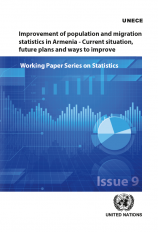
This report presents an assessment of the current situation in Armenia concerning the production of statistics on population and migration, covering data sources used, methods, reliability of statistics produced and their limitations. Future plans concerning the production of data on international migration using administrative sources are discussed. Some suggestions for possible improvements are formulated, with the objective of developing a system for producing data on migration in an efficient and sustainable manner, thanks to linkages with databases maintained by various national agencies. This report was produced following a request by the Statistical Committee of the Republic of Armenia (Armstat).
Download RUS
Published: February 2023
2021
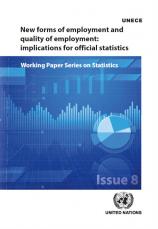
New forms of employment and quality of employment: implications for official statistics
This in-depth review presents a detailed overview of conceptual and statistical frameworks currently used to understand and measure new forms of employment. It discusses the concepts used by the statistical community when referring to new forms of employment and quality of employment and identifies key dimensions underlying different forms of employment. It provides a review of international statistical activity in this area and offers an analysis of key issues and challenges related to measuring new forms of employment, in line with the most recent update of the International Classification of Status in Employment and other frameworks.
Download RUS
Published: June 2021
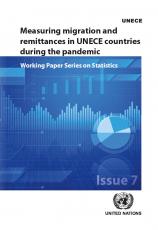
Measuring migration and remittances in UNECE countries during the pandemic
The COVID-19 pandemic had a huge impact on international migration and remittances in most countries, with a significant reduction of the flows starting in March 2020. At the same time, the pandemic created a peculiar context for the data collection practices in most National Statistical Offices (NSOs). Many NSOs use administrative sources and household surveys for collecting information about migration and remittances. As a consequence of the pandemic, they faced unexpected challenges of remote work and restrictions imposed on face-to-face communication, which required rapid shifts to new modes of work and different data collection methods.
This paper explores the administrative, logistical and methodological challenges faced by NSOs in the data collection and production of statistics on migration and remittances during the pandemic, and the strategies used to cope with them. The paper is based on the results of an ad hoc informal survey carried out among NSOs of UNECE countries. The paper was prepared by Anna Prokhorova, UNECE Consultant, and complements the paper “Analysis of Household Surveys on Migration and Remittances in the Countries of Eastern Europe, Caucasus, and Central Asia” (UNECE Working Paper Series on Statistics, Issue 4, June 2018)
Download ENG (1.9 Mb)
Download RUS (0.65 Mb)
Published: March 2021
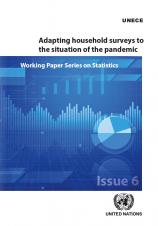
Adapting household surveys to the situation of the pandemic
In 2020, UNECE took first steps in gathering practices of national statistical offices in adapting their household surveys to the pandemic situation with respect to poverty measurement. The study, available in English and Russian, covered 25 national statistical offices participating in the UNECE work on poverty measurement. In some countries, surveys were postponed or cancelled, while the large majority (91%) of those who did take the surveys switched from face-to-face interviews to remote survey methods. About half of the countries altered existing questionnaires or developed new questions or modules to capture impacts of the pandemic on households and individuals.
The working paper provides an analysis of the challenges faced by countries and presents emerging good practices that some national statistical offices have undertaken in the context of the pandemic.
Download ENG (2.3 Mb)
Download RUS (3.1 Mb)
Published: January 2021
2019
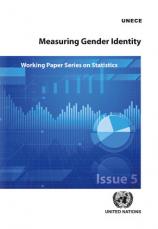
Measuring Gender Identity
The constantly evolving and often sensitive landscape of gender and gender identity brings with it a need to respond with appropriate statistical measures which capture what is important to the population. Changing social and legal contexts bring new pressures to ensure that often marginalized minority groups such as those with a transgender identity are adequately covered by statistics. This Working Paper explores current practices, challenges and possible solutions and provides the basis for future internationally-coordinated work on measuring gender identity.
Download (2.7Mb)
Published: March 2019
2018
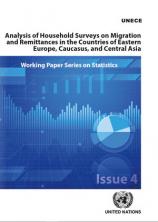
Analysis of Household Surveys on Migration and Remittances in the Countries of Eastern Europe, Caucasus, and Central Asia
This paper contains an overview of household surveys on migration and remittances in the countries of Eastern Europe, Caucasus, and Central Asia since 2007. It analyzes the methodology and questionnaires of the surveys and assesses to what extent the concepts, definitions and questions on migration and remittances used there allow producing internationally comparable data.
The report was prepared by Anna Prokhorova, UNECE consultant, in the project “Enhancing coherence and integration of economic and social statistics in support of the implementation of 2008 SNA” financed from the World Bank ECASTAT programme.
Download (2.75Mb)
Published: June 2018
2017
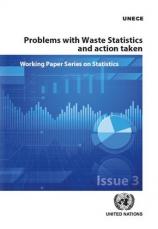
Problems with Waste Statistics and action taken
Waste statistics are of high policy interest in the context of SDGs, green economy, resource efficiency, Sustainable Consumption and Production, climate change and many other policy initiatives. In this paper, special attention is paid to reuse and recycling of waste, use of waste for generating energy, and hazardous waste. Emerging issues include food waste, electronic waste or end-of-life vehicles. The paper was prepared by UNECE and Statistics Netherlands.
Download (5.3 Mb)
Published: March 2017
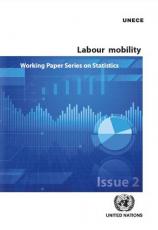
Labour mobility
This paper was prepared by Statistics Austria for the in-depth review on labour mobility and globalisation that the Bureau of the Conference of European Statisticians conducted in February 2015. It summarises international statistical activities related to measuring labour mobility, identifies issues and challenges, and makes recommendations on further work.
Download (2.9 Mb)
Published: February 2017
2016
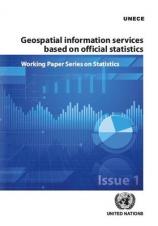
Geospatial information services based on official statistics
This review is concerned with how geospatial information can be used in the production of official statistics. It will consider how geospatial information fits within the statistical process and what barriers exist to exploiting the value of geospatial information for official statistics.
Download (2.7 Mb)
Published: October 2016

